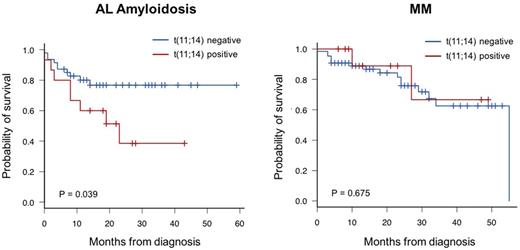Abstract
Translocation (11;14) and survival of patients with AL amyloidosis and multiple myeloma
Takao Yogo, Kanji Miyazaki, Kenshi Suzuki
Department of Hematology, Japanese Red Cross Medical Center, Tokyo, Japan
Background
Amyloid light-chain (AL) amyloidosis is characterized by the deposition of immunoglobulin light chains as amyloid fibrils. Immunoglobulin heavy chain translocation (11;14) is one of the most prevalent chromosomal abnormality in patients with AL amyloidosis, although its clinical significance is still unknown. In this study, we investigated the clinical significance of t(11;14) with AL amyloidosis by comparing with patients having multiple myeloma bearing the same translocation.
Methods
We reviewed 62 patients with AL amyloidosis and 78 patients with multiple myeloma who were newly diagnosed and examined t(11;14) using fluorescence in situ hybridization (FISH). The study was conducted between May 2012 and December 2016 at the Japanese Red Cross Medical Center.
Results
FISH-based t(11;14) were detected in 15 (24.2%) patients with AL amyloidosis and 13 (16.7%) with multiple myeloma. In patients with AL amyloidosis, t(11;14) gave poor overall survival (P=0.039), whereas the positivity of t(11;14) gave no significant difference in patients with multiple myeloma (P=0.675). Among AL amyloidosis patients, the 24-month survival rate was 38.6% in the t(11;14)-positive group and 76.7% in the t(11;14)-negative group. Although the percentage of plasma cells in bone marrow is high in the t(11;14)-positive group (7.4% vs. 3.6%, p=0.005), there is no significant difference in the overall survival between patients with more than 10% plasma cells (n=12) and patients with less than 10% plasma cells (n=50). Overall survival was superior in autologous stem-cell transplantation (ASCT) group (n=15) compared with non-ASCT group (n=47) (p=0.029). However, even after taking these factors into consideration, t(11;14) had a negative prognostic impact on the overall survival of patients with AL amyloidosis.
Conclusions
t(11;14) is associated with adverse outcome in patients with AL amyloidosis.
Suzuki: Bristol-Myers K.K: Honoraria; Novarltis: Honoraria; Celgen: Honoraria; Ono: Honoraria; Fujimoto: Honoraria; Takeda: Honoraria.
Author notes
Asterisk with author names denotes non-ASH members.


This feature is available to Subscribers Only
Sign In or Create an Account Close Modal